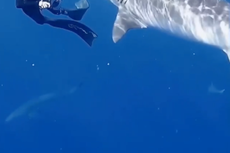Record-breaking cave diver dies during underwater expedition in Texas
Brett Hemphill was a well-renowned explorer in the the diving world, contributing to scientific developments around the US
A cave diver known for his record-breaking dives and contributions to scientific research has died during an underwater expedition.
Divers recovered the body of Brett Hemphill, the 56-year-old president of Karst Underwater Research, on Sunday after he failed to return from a cave exploration with his colleague Andy Pitkin, according to a statement from Karst Underwater Research.
The two divers had begun exploring the Phantom Springs Cave in West Texas at around 10.45am last Wednesday.
The research centre said they started in 450 feet of water at about 7,300 feet of penetration.
At 570 feet, camera footage captured Hemphill tying off a guideline on a rock before the pair became separated.
Hemphill never resurfaced from the cave.
The research centre said it suspected Hemphill was stuck over a mile inside an underwater cave, and so multiple recovery divers travelled “thousands of miles” to assist in the search.
“All cave recovery divers are self-supported – there are no organizations that fund those efforts. Cave diver recoveries are logistically difficult and this one is especially so,” the statement said.
“He was quite a ways back in there,” C.W. Stephens, a deputy at the Jeff Davis County Sheriff’s Office told the Tampa Bay Times.
“It’s supposedly quite technical diving in there. Once they locate (the body), if they do, there’s a lot of passages and current going all kinds of ways down there.”
Hemphill’s co-diver and director of Karst Underwater Research Any Pitikin issued a statement through the research centre on Sunday evening to announce that his body had been found and recovered.

“Please allow us some time to come to terms with his loss, as up until now we have been focused on the recovery,” the statement said.
Hemphill was president of Karst Underwater Research, a non-profit organisation based in Florida, focused on scientific research to help preserve and protect underwater caves.
He had an illustrious career as a cave explorer, spending over 25 years smashing diving records and collecting scientific data.
In 2008, the diver and his team of expeditionists set the US’s cave depth record at Weeki Wachee Springs in Florida and then broke their own record in 2013 at the Phantom Springs Cave in Texas (travelling around 465 feet deep and 8,000 feet into the cave), according to TekDiveUSA.
These deep water caves are infamously difficult to pass through, with Phantom Springs Cave known as a very difficult dive.
When Hemphill and his team originally went diving there back in 2013, they each needed to obtain a scientific research pass as it was owned by the US government.
But, according to Divernet, its ownership has since been transferred to a nearby ranch, making it more accessible to dive there.

Hemphill was also known for advancing geographical and scientific knowledge through his underwater research, with many projects on the research centre’s website describing the use of data collection equipment in trips, as well as little by little discovering unexplored parts of the caves.
The well-renowned diver is also credited for designing the “Armadillo” side harness – a more compressed harness used so divers can swim through small passages without bulking air canisters.
He has also explored and researched caves on the Florida coast, Missouri, Bahamas, Cay Sal Banks, Dominican Republic and Yucatan Peninsula, according to his profile on the research centre’s website.
Join our commenting forum
Join thought-provoking conversations, follow other Independent readers and see their replies
Comments


Bookmark popover
Removed from bookmarks